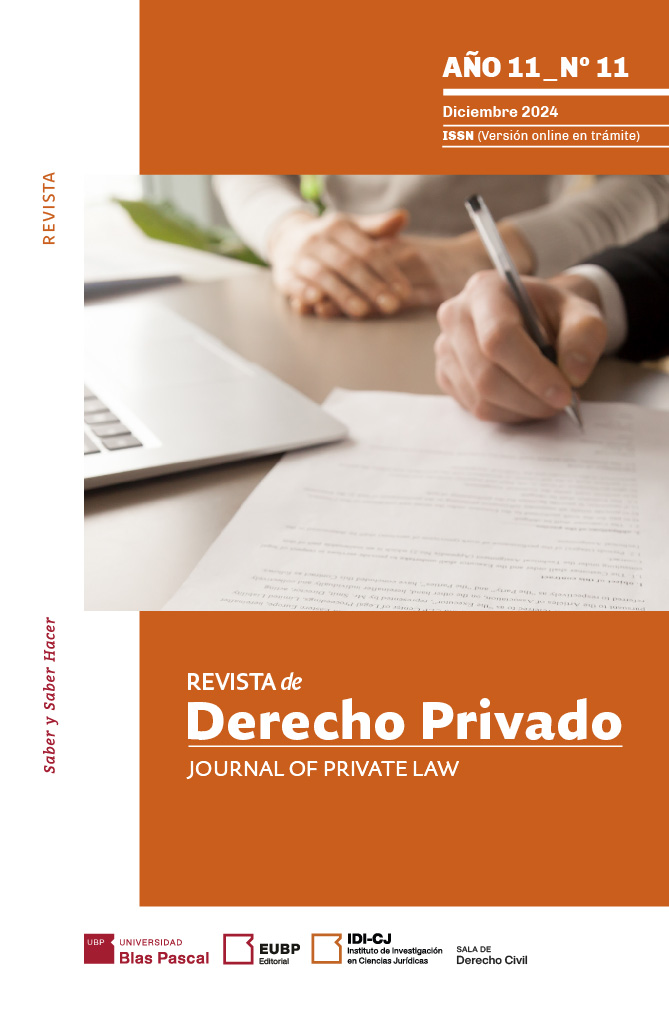Party autonomy in international commercial contracts with a weak bargaining party: inherent challenges and possible solutions. Report and recommendations on good practices
desafíos inherentes y posibles soluciones
DOI:
https://doi.org/10.37767/2362-5325(2024)009Keywords:
International commercial contracts, Weak bargaining party, Free discussion contracts, Contracts with non-negociated standard clauses, Conflict party autonomy, Recommendations, Good practicesAbstract
I. Need to correct the little or no attention that is generally paid to international commercial contracts with a weak bargaining party. a) Distinction between international commercial contracts free discussion contracts and international commercial contracts with standard clauses. b) The work of the Inter-American Juridical Committee of the OAS. c) The practical usefulness of the document prepared by the IAJC for legal operators.
II. The contents of the IAJC’s document. a) Presentation of the topic. b) Arguments for and against the admission of conflict autonomy in adhesion contracts.
III. The questionnaire and its responses as the basis of the Report and its Recommendations and other considerations. a) The objective of the questionnaire circulated to chancelleries and specialists by the Department of International Law of the OAS. b) The feedback received through responses to the questionnaire. c) Other considerations. 4. Recommendations and possible best practices in international contracts between merchants with a contractually weak party. a) Objectives and rationale of these recommendations and possible best practices. b) Recommendation 1: Existence and validity of the consent of both parties to the contract. c) Recommendation 2: Documentation of express agreement to the choice of law or judge and burden of proof of consent. d) Recommendation 3: General interpretation of forum and/or law selection provisions included in adhesion contracts or the equivalent. e) Recommendation
IV: Specific interpretation of choice-of-forum and/or -law provisions in adhesion contracts or the equivalent. f) Recommendation 5: Acceptance of choice-of-forum provisions in adhesion contracts or the equivalent by the adhering party. g) Recommendation 6: Specific interpretation of choice-of-law provisions in
adhesion contracts or the equivalent. h) Recommendation 7: Substantive justice in a specific case. i) Recommendation 8: Policing, mandatory, or necessary laws. j) Recommendation 9: International public policy.
V. Conclusions
References
AG/RES. 2703 (XLII-O/12) FORTALECIMIENTO DE LAS ACTIVIDADES DEL PROGRAMA INTERAMERICANO DE FACILITADORES JUDICIALES (Aprobada en la segunda sesión plenaria, celebrada el 4 de junio de 2012). Disponible en: http://www.oas.org/es/sla/ddi/docs/AG-RES_2703_XLII-O-12.pdf
ALMIRATI, Magistrado; en Sentencia Nº 147, 24/5/1988, Uruguay, publicada en Revista de Transporte y Seguros Nº 2, 1989, caso Nº 19, p. 47.
IUD, Sugerencia; Asesora Jurídica de la Cancillería argentina, en reunión de setiembre de 2022.
SCOLES, Eugene F. & HAY, Peter; Conflict of Laws, Hornbook Series, St. Paul, Minn., West Publishing Co., 1982.
The Bremen v. Zapata Off-Shore Co. :: 407 U.S. 1 (1972)

